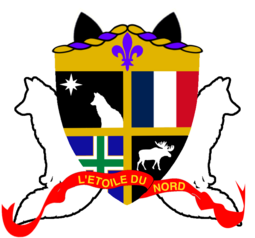User:Caldera
Caldera
- 605 edits
Welcome to Caldera. We are a beautiful island nation with a unique and vibrant culture that is sure to be the highlight of any vacation. Please take some time to explore this page and information about visiting us before you plan your vacation of a life time.
Adian | |
|---|---|
 Napoleon Crossing the Alps, by Jacques-Louis David | |
| Born | Adian Vandal Minnesota or Québec |
| Occupation |
|
| Home town | Duluth or Trois-Rivières |
| Political party | Division of Arms |
| Awards | 9 counts of Order of the Lore (day) |
Ongoing work
See some stuff pushed aside here.
Volin language
Lachsen gun manufacturer
Daxian Invasion of Austro-Caldera
Assumed Armorial achievement of Adian Vandal
All Articles
Family History
Born to a Franco-Norwegian father and a German mother, my family is dominated by it's French lineage, able to be traced as far back as the mid 1700s, when the Vandal family split. The majority remained in France (particularly Normandy), and the rest fled to what is now Canada. In Canada, the family split again, with an eastern portion remaining in Québec, and a western portion spreading themselves along the Red River Valley. Further family split during different conflicts resulted in many subgroups, of which will now be listed below.
Original Vandals
The original family, likely founded sometime between 1300 and 1600 in Normandy, France. These Vandals speak French and practice Roman-Catholicism, the first to do so. Sometime in the 1750s, members of this branch migrated to Québec.
During the French Revolution, Vandals joined on both sides of the war. Later, Vandals fought for Napoleon I to secure France's dynasty. During WWI, Vandals fought against the Germans, hoping to reclaim lost French territory. During WWII, this family branch were quite controversial, and somewhat supported Vichy France, although they vowed against the racist ways of the reich.
Eastern Vandals
Founded in the 1750s in Les-Trois-Riviéres, Québec, Canada. This branch of the family stays most true to the original, speaking French and practicing Roman Catholicism. They stayed away from conflicts until WWII, where Vandals produced weapons for the allies.
Western Vandals
Founded in 1809 in the Red River Valley Settlement, Manitoba, Canada. This branch of the family mostly speaks English and practices forms of native reigions, as this branch connects with the Métis natives, and much of this branch's culture is defined by it. Throughout the 1800s, the Western Vandals protested against English rule, and in the 1880s Western Vandals joined Métis natives in battles against the English. Several were arrested and one was killed, leading to the fleeing of this branch into two others.
Vandales
Founded in Pembina, Minnesota Territory, United States, in 1850, the Vandales are the smallest of the branches and are not known for any significant accomplishments.
Vondals
Founded in Winnipeg, Manitoba, Canada, sometime in the 1890s, this branch of the family honors its French roots and hosts various trips to Québec, with some members going to be married in France before returning to Canada. During WWII, they also contributed to the war efforts, either by fighting directly or by helping to produce weapons at factories.
